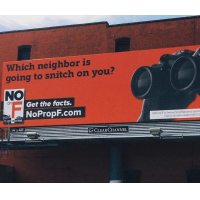San Francisco Voters Love Their Airbnb

In case there was any doubt, San Francisco voters clearly demonstrated Tuesday they welcome the transformation of The City that is making it rapidly unrecognizable, and often uninhabitably expensive, for longtime residents.
Residents rejected Proposition F, which would have reined in Airbnb rentals in the 5-year-old startup’s hometown, and Proposition I, a bid to temporarily halt market-rate development in the historic Mission District. Prop. F lost 55.1% to 44.9% and Prop. I was defeated 57.4% to 42.6%.
Prop. F would have limited short-term home and apartment rentals to 75 days a year, and require all the owners to register with the city and pay hotel taxes. The law would have empowered private citizens to sue violators living within 100 feet of them.
Prop. F received international attention. Airbnb is one of the fastest growing startups in the world and is valued at $25 billion. The company has been the subject of controversy in many of the 34,000 cities in 90 countries where it operates. The website has more than 1.5 million listings.
Airbnb, and short-term rental outfits like it, have been blamed for a host of urban ills. A report (pdf) in March said the company was squeezing the already-tight Los Angeles housing market and was being gamed by entrepreneurs, who are anything but the mom-and-pop renters and homeowners Airbnb’s marketing claims.
Airbnb says on its website that it “is the easiest way for people to monetize their extra space.” And a lot of people make good money renting it out. But the space is often not extra. Nearly 90% of the Airbnb revenues in Los Angeles “are generated by lessors with whole units and leasing companies who rent out two or more whole units,” according to the report.
Airbnb costs cities hotel tax revenues, disrupts communities with business and vacation transients, reduces vacancy rates and ramps up rental prices. In San Francisco, where rents rival Manhattan, that exacerbates affordable housing problems already made manifest by the tech boom.
U.S. Senator (and former San Francisco Mayor) Dianne Feinstein supported Proposition F. Mayor Ed Lee, who won his re-election race convincingly Tuesday, and another former mayor, Lieutenant Governor Gavin Newsom, opposed it.
Airbnb poured $8 million into the Prop. F campaign, saturating the airwaves and plastering the city with advertisements warning of dire consequences should the measure pass. The opposition, principally the hotel workers union, spent $482,000.
The San Francisco Chronicle noted that Airbnb had a built-in bloc of voters in the city—138,000 residents who used the service to either host or rent a place. That’s 30.8% of the city’s 446,841 registered voters. TechCrunch said Airbnb campaigners knocked on 236,413 doors, made 226,597 phone calls and posted 2,015 window signs.
Prop. I was an attempt to slow the Mission District transformation that has seen its Latino population drop from 60% just 15 years ago to 48% in 2013. A new report (pdf) projected Latinos would make up 31% of the neighborhood by 2025.
–Ken Broder
To Learn More:
Prop. F: Voters Reject Measure to Restrict Airbnb Rentals (by Carolyn Said, San Francisco Chronicle)
Airbnb, Proposition F and the Shared Hypocrisy of Bay Area Housing (by Kim-Mai Cutler, TechCrunch)
Measure to Restrict Airbnb Rentals Loses in San Francisco; Mayor Ed Lee Reelected (by Matt Hamilton and Lee Romney, Los Angeles Times)
The Fate of San Francisco Hangs in the Balance: The Pivotal Election Day Contests That Could Change Everything (by Jack Mirkinson, Salon)
The Mission District Is Losing Its Latino Population: Report (by Gillian Edevane, NBC Bay Area)
Airbnb Apologizes for Trying to Woo S.F. Voters with Obnoxious Billboards (by Ken Broder, AllGov California)
- Top Stories
- Controversies
- Where is the Money Going?
- California and the Nation
- Appointments and Resignations
- Unusual News
- Latest News
- California Forbids U.S. Immigration Agents from Pretending to be Police
- California Lawmakers Urged to Strip “Self-Dealing” Tax Board of Its Duties
- Big Oil’s Grip on California
- Santa Cruz Police See Homeland Security Betrayal in Use of Gang Roundup as Cover for Immigration Raid
- Oil Companies Face Deadline to Stop Polluting California Groundwater





